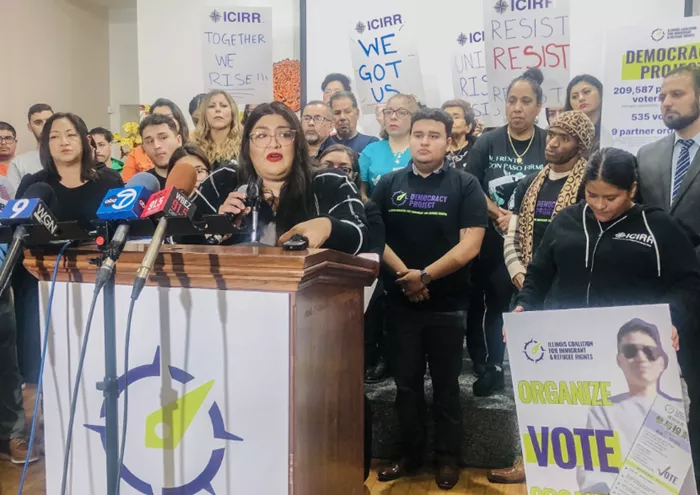The morning after Tuesday’s elections, Graciela Guzmán, newly elected as state senator for Illinois’ 20th District, should have been celebrating. Her district covers parts of Hermosa and Belmont Cragin, two predominantly Latino immigrant communities on Chicago’s Northwest Side. Instead, her phone was inundated with urgent calls about the re-election of President Donald Trump.
“All morning, I’ve been getting calls from organizers, community members, schools, asking, ‘What is going on? What are the resources? What are we losing with a Trump administration?’” Guzmán said in a press conference Wednesday, organized by the Illinois Coalition for Immigrant and Refugee Rights.
Other local officials and activists shared her concerns, preparing for the possibility of a second Trump presidency that could bring back harsh immigration policies. These policies might include travel bans, workplace raids, and zero-tolerance measures that separated thousands of families during his first term.
During the campaign, Trump promised to implement stricter border control, mass deportations, and cut federal funding to sanctuary cities—jurisdictions that limit cooperation with federal immigration enforcement. In Illinois, where an estimated 400,000 undocumented immigrants live, advocates are taking these promises seriously and are preparing for the challenges ahead.
Organizing for Protection
“We are launching a community defense plan that starts today,” said Dulce Ortiz, executive director of Mano a Mano, a Little Village–based immigrant services organization. “We will strengthen our deportation defense efforts through ‘know your rights’ trainings.”
These trainings, often held by immigration rights groups, educate individuals on their legal rights, regardless of immigration status. For instance, people have the right to refuse entry to authorities without a criminal warrant and the right to remain silent while consulting an attorney.
Groups like The Resurrection Project, Chicago Workers Collaborative, and Centro Sin Fronteras are also organizing in response to the potential impact of a second Trump presidency. On Thursday, they gathered in Chicago’s Pilsen neighborhood to announce similar plans.
Concerns for New Migrants
Ana Gil Garcia, chair of the Illinois Venezuelan Alliance, expressed concern over the fate of newly arrived migrants, particularly those from Venezuela. Since 2022, more than 50,000 Venezuelan migrants have arrived in Chicago, many seeking asylum. These migrants must apply for asylum within one year of their arrival, but some may be eligible for Temporary Protected Status or humanitarian parole, which offer temporary protection from deportation while applications are processed.
“We need more legal clinics before January to help migrants who haven’t started their application process,” Gil Garcia said. While President Joe Biden’s administration expanded these programs to include Venezuelans and others, not everyone qualifies.
Last year, the city of Chicago, along with state and federal partners, began screening new arrivals for eligibility. However, of 21,716 asylum seekers screened from November 2023 to August 2024, only about 8,939 qualified, according to The Resurrection Project.
If Trump follows through with his promises to tighten immigration restrictions, the future of these programs is uncertain.
Protecting Local Sanctuary Policies
Advocates are also focused on preserving local policies designed to protect undocumented immigrants. The Welcoming City Ordinance and the Illinois TRUST Act prevent local law enforcement from cooperating with federal immigration authorities on deportations.
“ICE has often asked local law enforcement to set up security perimeters around neighborhoods to assist with enforcement,” said Mark Fleming, associate director of litigation at the National Immigration Justice Center. However, current laws prevent local police from participating in these operations.
Despite this, Trump has vowed to withhold federal funding from sanctuary cities. In his first term, he targeted the Edward Byrne Memorial Justice Assistance Grants, a major source of federal funding for local law enforcement. His attempts to block this funding were thwarted by the courts.
Local laws can only do so much, though. City and state officials cannot stop federal agents from operating within city limits, especially if they have administrative warrants, which can be issued for noncitizens not complying with immigration laws.
During Trump’s first term, ICE carried out large-scale enforcement operations, including one in 2018 that led to the arrest of 156 individuals in the Chicago area. While only a small number of those arrested had criminal warrants, many were detained in what is known as “collateral arrests,” when individuals are detained based on their immigration status while enforcement actions are taking place in their communities.
Fleming’s organization, alongside the ACLU and other plaintiffs, filed a lawsuit against the U.S. Department of Homeland Security over these warrantless arrests, leading to a settlement that limits ICE’s powers without a warrant. This legal protection could be threatened if Trump’s administration pushes for tougher enforcement.
Education and Solidarity
Fleming emphasized that immigrant communities must continue to educate themselves about their legal rights. “We need to encourage people to understand their rights, know their options, and stand in solidarity with immigrant neighbors,” he said. “We’ve got to keep fighting for a better future for this country.”
As Trump’s second term could bring renewed challenges to immigrant rights, community leaders and advocates are readying for a long fight. They are determined to defend the rights of immigrants, who they believe have long contributed to the fabric of American society.
Related topics:
- How Trump’s Mass Deportation Plan Would Impact Immigrant Workers and the Economy
- Immigrant Communities Fearful of the Impact of Trump’s Deportation Plan
- Trump Allies and Private Sector Brace for Widespread Immigrant


